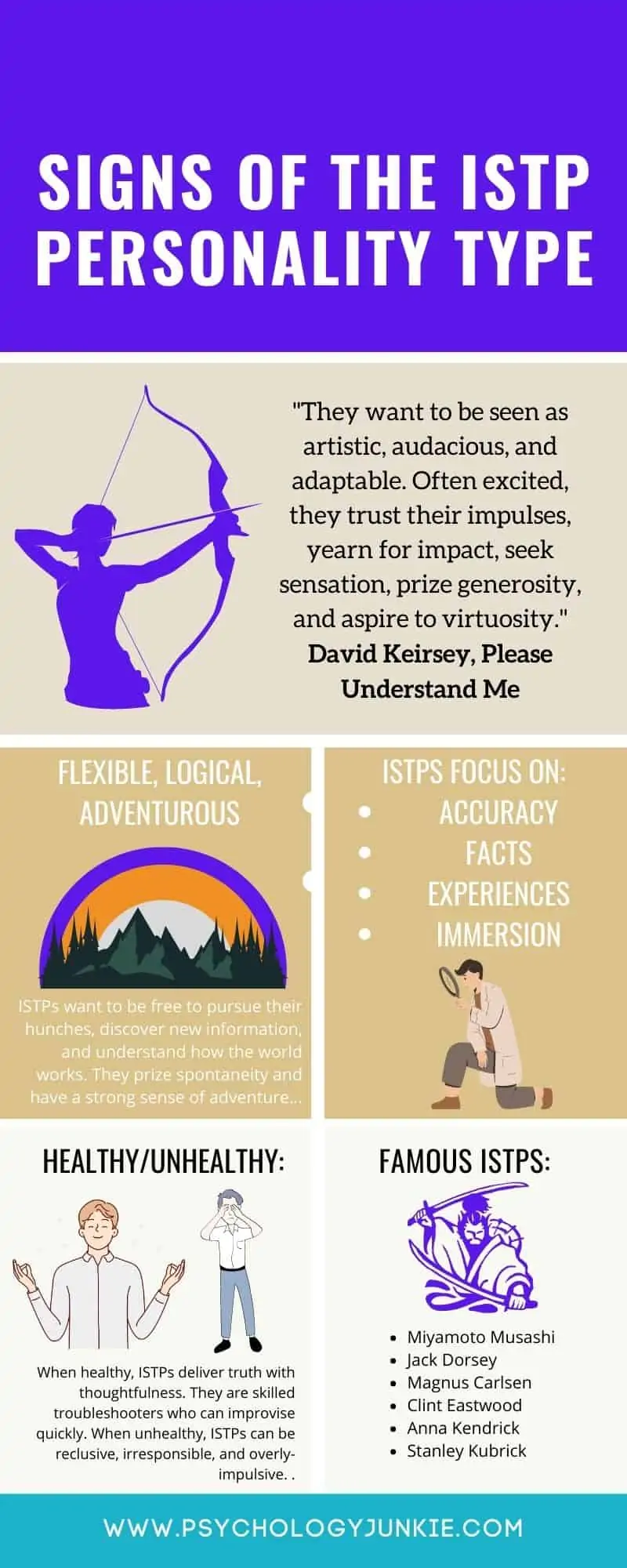24 Signs That You’re an ISTP, the Vigilante Personality Type
Have you been wondering if ISTP is your best-fit personality type?
Do you feel torn between two or more personality types?

In today’s article we’re going to explore 24 common characteristics and experiences of the ISTP personality type. We’ve titled the ISTP the “Vigilante” because it captures their independent, restless spirit.
Let’s get started!
Not sure what your personality type is? Try out our most highly recommended personality questionnaires:
- You can take our free personality questionnaire here
- You can take Personality Hacker’s highly accurate personality questionnaire.
- You can take the official Myers-Briggs Type Indicator® for $49.95
This article contains an affiliate link to a questionnaire on Personality Hacker. If you purchase one of their courses, I get a small kickback that I can use to pay for hosting and other demands of this site. I only recommend courses I love.
24 Signs That You’re an ISTP, the Vigilante Personality Type

#1 – You Hate Repetition
You have a desire to learn new things and explore beyond the boundaries of what you’ve been told. Repetition can feel like the enemy, and it’s likely that you will become easily bored in jobs or situations which require you to do the same thing day-in and day-out.
#2 – You’re Curious About How Things Work
Whether it’s the inner workings of an engine, or a new computer program, you have an insatiable curiosity when it comes to understanding how things work. You are interested in breaking apart objects or even arguments into all the components and pieces. As a child you probably enjoyed taking your toys apart so you could see how all the pieces fit together!
#3 – You Need to be Independent
You crave the freedom to act now based on your instincts, hunches, or intuitions. While you do map out your immediate actions with a discerning, logical eye, you still hate structure and a lot of commitments. Not being able to use your natural talents in the moment and explore and see new things would be deeply painful for you.
#4 – You Quickly Find Solutions to Problems
Linda Berens, psychologist and author of The 16 Personality Types: Descriptions for Self-Discovery, writes that ISTPs “quickly grasp the most expedient solution, one that will fix it. Once they figure out the immediate next step, they want to move on it, see what happens, and then move on to the next challenge.. Others see the fearless, just-do-it attitude and miss the analysis behind the scenes.” (14)
You do a lot of inner mental analysis before you jump into action, but that analysis happens at speeds most individuals can hardly fathom. While you might look impulsive, you’ve probably analyzed the situation from several angles before making a move.
#5 – You Are Highly Observant
As a type with Extraverted Sensing (Se) you are deeply in tune with the present moment and all that is happening around you. While your quiet aura might give others the impression you aren’t paying attention, there’s rarely a time when your head is “in the clouds.” You have a keen eye for details and can pick up on the smallest changes or subtleties within your environment.
#6 – You Have a Knack for Multi-Tasking
You don’t like working on one thing at a time. Rather, you usually have several projects going on at once, and you bounce between them as the inspiration strikes.
#7 – You Show You Care By Problem-Solving
When you care about someone you try to show it by solving problems for them. You like to help people fix things, figure out new technologies, tools, or objects. Many ISTPs are called upon for help by friends and family on a regular basis, especially in crisis situations. While you may not be effusive about your feelings, your love often shows up in troubleshooting, as well as sharing positive experiences and time.
#8 – You Try Not to Offend
Sure, you’re a Thinking personality type and lots of people like to associate that with brusque, devil-may care tactlessness. But this is not the case for most ISTP (and INTP) personality types!
You, like each personality type, can show great depths of caring. In fact, because you have inferior Extraverted Feeling (Fe) you tend to be more sensitive to signs that you might have offended someone.
The inferior function is a mental process that we value, but doesn’t come naturally to us. We’re often afraid it will trip us up, and when it does we feel really embarrassed or ashamed.
Because your inferior function is Extraverted Feeling, you tend to feel worried about tripping up with someone emotionally. You like to keep things even-keeled and tend to feel great embarrassment when you offend someone or make a social faux pas. Often when you do offend, it’s inadvertent rather than intentional. That said, in your very close relationships you like to be able to let loose, tease, or express your own straightforward thoughts directly.
#9 – You Get Critical and Sarcastic When Being Micro-Managed
You don’t take well to strict regimes or micro-managers. You need freedom and a lot of space to act on your hunches, try new things out, and solve problems in your own way. Too much structure makes you feel trapped and frustrated; when pushed too hard in this direction you may start lashing out with sarcasm or criticism. You don’t do well when you’re cornered and boxed in. Understanding this about yourself can help you recognize when it’s time to take action and get out of a stifling situation.
#10 – You Appreciate Straightforwardness
You don’t appreciate small talk, although you see it as a necessary evil in the modern world. You’d rather get to the point and cut out the nonsense. Although you may sometimes appear curt, this isn’t necessarily your goal; it’s just that you don’t feel the need to adorn your statements with unnecessary words.You appreciate people who can communicate their needs, thoughts, or feelings directly rather than giving ambiguous or mixed signals.
#11 – Sitting and Talking About Your Emotions Feels Weird
Displays of strong emotions can feel overwhelming to you, and you often struggle to decode your personal feelings. Having a serious in-depth discussion about your feelings can be deeply uncomfortable and confusing. You may feel lost for words, unable to verbalize whatever emotional waves are welling up inside you. Simultaneously, you might feel unsure how to respond to the other person’s emotional revelations.
#12 – You’re Always Tweaking Your Thought-Process
You are constantly gathering new information and using it to tweak and refine the categories of information you already have neatly stored away in your mind. You always feel like there is more to learn and a deeper level of understanding how the world works. Chasing down ideas, exploring, experimenting, and learning come naturally to you.
#13 – You Have a Strong Sense of Adventure
You crave exploration and new experiences. You can get bored easily, so to keep yourself engaged you seek out the unknown, boldly trying new things and experimenting with different possibilities. Whether you’re trekking off on a solo hiking mission or modifying your new bike, you always enjoy the thrill of discovery.
#14 – You Can’t Stand Busy Work
You thrive when you are presented with real intellectual challenges, but if faced with redundancies or busy-work your energy quickly drains. You might be tempted to just go through the motions, but eventually you get so fed up that you’ll start moving your energy elsewhere or creating systems that can do your busywork for you.
#15 – You Are Practical
You consider yourself a realist at heart. In most situations you will focus on the facts at hand, what’s relevant, and what will work to solve the problem. You don’t jump to conclusions or get lost in flights of fancy; instead you focus on practical solutions and solving problems as they arise.
#16 – Fun is a Priority
While you might not seem like the life of the party to everyone else, you have a strong sense of fun. In order for you to complete a project you have to make it fun in some way; whether that’s through turning it into a game, setting a personal challenge, or just finding humor in the situation. You’d rather have a career you enjoy than one that pays more or offers you more prestige. Of course, there is always a caveat. If you can expend little energy and get paid a lot then you can fill your free-time hours with the fun you’ve been putting off throughout the day.
#17 – You Have a Core Drive to See Progress
You are action-oriented and enjoy knowing that every day you’re getting a little closer to your goals. A challenge makes life more exciting and meaningful to you, but this doesn’t necessarily mean you have to compete with others. You are your own competition, and you enjoy seeing how far you can go with your interests and hobbies. Stagnancy is boring and a mundane, predictable lifestyle is a nightmare for you.
#18 – You’re Skeptical of Rules
You’re not a fan of black-and-white thinking because there’s always more nuance in your mind. Rules don’t take into account all the logic of a situation and they often seem needlessly bureaucratic and pointless to you. It might even give you a thrill to break the rules just to see what happens!
#19 – You Spot Incongruencies Easily
You naturally spot inconsistencies and logical fallacies in others’ arguments or beliefs. While you may not always jump in with a correction, it can sometimes make you feel cynical about the human race. You also can easily spot inconsistencies in your own thinking, and it’s a big goal of yours to have “clean” data and accurate arguments. It can be especially frustrating in the modern world to see such a lack of critical thinking and people making arguments based on trends, clickbaity social media posts, or personal biases.
#20 – You Probably Felt Misunderstood as a Child
Most young ISTPs run into the problem of being called “rude” or “impolite” as children. Why? Usually because they would express truths without realizing how those truths would make people feel. Young ISTPs are less in touch with the feeling side of their personality type, and they thrive when they can express their honest thoughts or point out inaccuracies in others’ thoughts. Unfortunately, the world doesn’t often appreciate this talent. Rather than being praised for your analytical mind, you were probably told to be quiet, to be more polite, or to stop nitpicking. Maybe you were forced to “believe” things that felt unreasonable and illogical to you, but you had to go along for fear of retribution. Over time, many young ISTPs learn to keep their mouths shut and internalize more of their thoughts because they are so tired of being misunderstood.
#21 – You Have a Strong Need for Alone Time
As an introvert you need ample alone time to process your thoughts and experiment with ideas and activities. Unfortunately, the world around us doesn’t always cater to introversion. It’s easy for ISTPs to run into “people overload” and burn out. Joel Mark Witt and Antonia Dodge, authors of Personality Hacker, state “The enemy of Accuracy (Introverted Thinking) is relationship overload. Accuracy users (ISTPs and INTPs) require concentrated, focused time. If an ISTP is responsible for meeting other people’s needs or is frequently interrupted, they will lose their focus and mental stamina.” (291)
Getting alone time can be a huge challenge, especially if you have a demanding job or a large family. But try to make sure you have at least one big block of unstructured alone time every day, even if it’s only an hour before bed.
#22 – You Enjoy Novelty and Variety
Anything new or unusual tickles your curiosity and makes life more interesting for you. You are always on the lookout for new knowledge or experiences and crave chances to try out new things. You know the world is vast and you don’t want to have tunnel vision or miss out on any of the amazing opportunities around you.
#23 – You Appreciate Efficiency
You will think up creative ways of making tasks easier and more expedient. You hate wasted effort and energy, and you are often the one taking a look at tasks to find ways they can be streamlined. You’re also someone who probably carries in way more grocery bags in one trip than other people would dare to attempt.
#24 – You Are Egalitarian
You don’t like controlling other people or barking out a lot of orders or rules about how people should live their lives. Unless someone is attacking your core principles, you don’t really care to get involved in their business. This doesn’t mean you won’t argue with someone who is making no sense to you; but you usually can tell pretty quickly which people you’d be wasting your breath on.
What Are Your Thoughts?
Did you enjoy this article? Do you have any stories, insights, or experiences you’d like to share? Let us and other readers know in the comments!
Find out more about your personality type in our eBooks, Discovering You: Unlocking the Power of Personality Type, The INFJ – Understanding the Mystic, The INTJ – Understanding the Strategist, and The INFP – Understanding the Dreamer. You can also connect with me via Facebook, Instagram, or Twitter!
Other Articles You Might Enjoy:
What ISTPs Do When They’re Really Stressed Out
10 Things ISTPs Look For in a Relationship
Sources:
Personality Hacker by Joel Mark Witt and Antonia Dodge
MBTI® Manual – A Guide to the Development and Use of the Myers-Briggs Type Indicator® Instrument by Isabel Briggs Myers, Mary H. McCaulley, Naomi L. Quenk and Allen L. Hammer
The 16 Personality Types by Linda V. Berens and Dario Nardi
Retry later











Susan,
You hit the nail on the head with these. Thanks as always.
Thank you!! I appreciate the encouragement 🙂
Wouldn’t it help to explain what ISTP means? Is this article intended to be of interest only to people familiar enough with the subject to already know what ISTP means?
Hi David!
Thanks for bringing this up. Having an introduction to what the code means would be a good thing to add in here. If you’d like to find out more about what ISTP means and what the letters stand for you can see this page: https://www.psychologyjunkie.com/the-istp/
What does ISTP. mEAN !!!!
ISTP = introverted, sensing, thinking, perceptive.
Introverted = tends to be quiet, prefers alone time over socializing
Sensing = practical, details-oriented, focussed on reality/production rather than ideas/design
Thinking = logical, analytical, tends to be masculine
Perceptive = spontaneous, goes with the flow
Sister Girl Susan forever makes insight & further Light a most valuable tool of assistance as we negotiate the success with our pears, both near & far. on this third Rock from the SUN. And that is a labor of love with your assistance & gift of sharing Light! VIRTUS JUNXIT MORS NON SEPERANIT -14* YOU MAKE A DIFFERENCE!
Wow it’s sounds like me a lot. I love me so much!!
Finally I’ve got to understand why I’m the way I am. Thankyou for the article
Thank you for reading it! I really appreciate it 🙂
Spot on. Thank You Susan Storm
Yeah fits me 99% of it/. Thanks for sharing your insight with all of us appreciate it
As an INFJ, my ISTP son is one of my favorite people. I can count on him to see the real issue and solve it. He is baffled and a bit undone by those emotional experiences but he also is known as a very kind person.
True.
I think my 10 year old daughter is an ISTP, but not all of the things on this list fit her. She likes building things, but not taking them apart. She doesn’t really like solving problems; she prefers easy schoolwork and just having fun. Her lowest function is definitely Fe.
I would have thought that inferior Fe meant being weak in Fe. But instead, this article describes it as trying not to offend someone. My daughter is very rude to everyone. She will say someone looks weird when they can hear her saying that, she refuses to use manners or say common things like “hi” and “bye” to people, or to look at them when they’re talking to her. She’s been told how she is being rude, but she claims to not understand why it’s rude.
Hi Jinx! Thanks for the comment! So the inferior function is one we still value, but one that feels always out of reach. So ISTPs with inferior Fe still value it, and often seek it out in relationships or in partners, but they often feel like they can’t quite figure out how to harness it in themselves. They may try, but it feels awkward and uncertain to them. But it’s still a valued function for ISTPs. Anything in the primary stack is valued to some degree. In contrast, types that lack Fe tend to value it less (TJs and FPs), and may even be suspicious of it. For example, I’ve known several Feeling-Perceiving children who have been outright rude because they’re being “real” and don’t consider the manners of others as authentic enough. They may have a distaste for societal niceties, seeing those as false or unimportant. This is certainly not the case for all FPs, but it certainly does happen if they don’t have a personal value built around manners and making others feel good. On top of that, if the child is 10-years-old, she will still probably be working primarily on her dominant function without a lot of help from her other functions, so some of the signs in this article may not apply as much because she’s still in early development. Hope this helps!